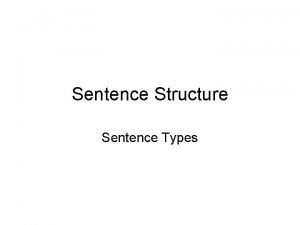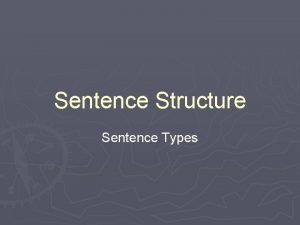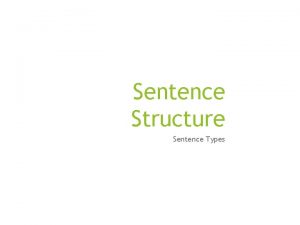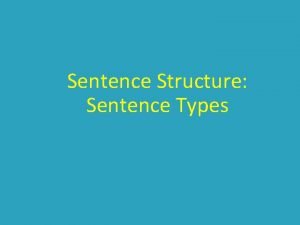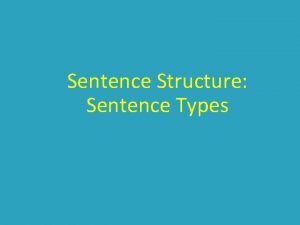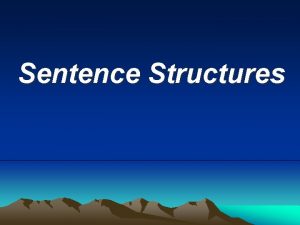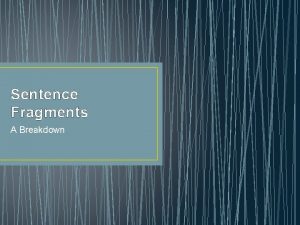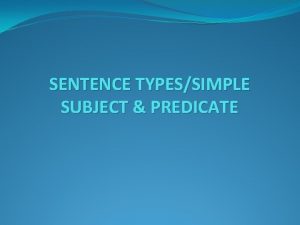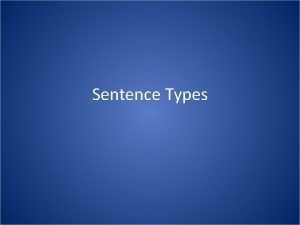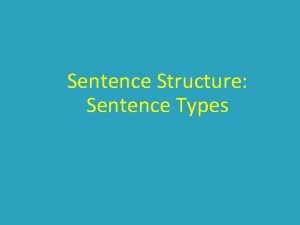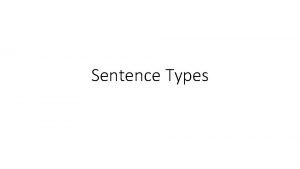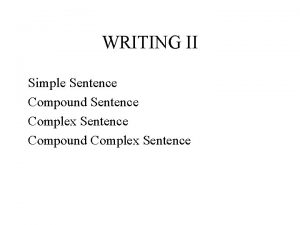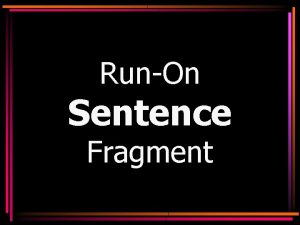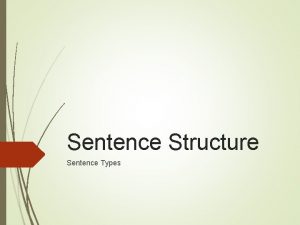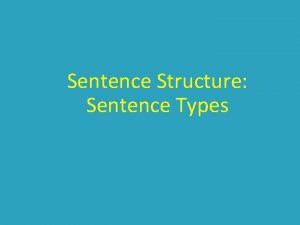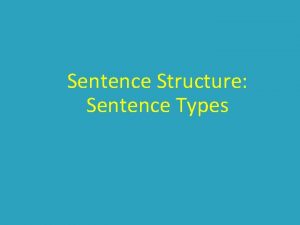The Sentence The Sentence A sentence is a



























- Slides: 27

The Sentence

The Sentence A sentence is a group of words that expresses a COMPLETE thought.

Kinds of Sentences All sentences can be grouped according to their purpose. A sentence can make a statement, ask a question, give a command, or express a strong feeling. The punctuation mark that belongs at the end of the sentence is determined by the purpose of that sentence. What are the 4 Kinds of Sentences? ?

Declarative Sentence A declarative sentence makes a statement or expresses an opinion and ends with a period. Whales are the largest animals in the world today. (Statement) Whales probably are not afraid of people. (Opinion)

Interrogative Sentence An interrogative sentence asks a question and ends with a question mark. Have you ever seen a whale?

Imperative Sentence An imperative sentence makes a request or gives a command ends with either a period or an exclamation point. Read this book about whales. (This imperative sentence ends with a period because it is a mild request. ) Watch out for that whale approaching our boat! (This sentence ends with an exclamation point because it is a strong command. )

Exclamatory Sentence An exclamatory sentence expresses strong feeling and ends with an exclamation point. What a huge animal the whale is!

Your Turn… Name the kind of sentence and the punctuation. 1. Kelly’s Pond has finally frozen over 2. Find your skates 3. Can you practice after school 4. Bring your hockey stick 5. Does anyone have an extra hockey stick 6. We need a good goalie 7. Jim could be our goalie 8. What a game this will be 9. Don’t be late 10. I’ve waited all winter for this game

Subjects and Predicates A sentence is a group of words that expresses a complete thought. In order to express a complete thought, a sentence must have two basic parts – a subject and a predicate. The subject names the person, place, or thing the sentence is about. The predicate tells something about the subject.

Subjects and Predicates My best friend lives a block away. “My best friend” names whom the sentence is about. “lives a block away. ” tells what the subject is or does.

Complete Subjects A complete subject includes all of the words used to identify the person, place, thing, or idea that the sentence is about. To find a complete subject, ask yourself, Who or what is doing something? or About whom or what is some statement being made. The birds in our backyard ate all of the bread. (Who or what is doing something in this sentence? ) The birds in our backyard is the complete subject. The calendar in the kitchen is a year old. (About whom or what is the statement being made? ) The calendar in the kitchen is the complete subject.

Find the Complete Subject 1. The wingspan of an albatross averages 10 to 20 feet. 2. The nest of a golden eagle can weigh several tons. 3. The average hummingbird weighs less than a penny. 4. Small, colorful orioles nest in the same tree year after year. 5. Some eagles in South America feed on monkeys. 6. Owls in the forest see considerably better at night than most animals. 7. Some wild ducks build their nests in treetops. 8. The largest bird’s egg in the world belongs to the ostrich. 9. The unusual penguin builds its nest out of rocks. 10. A female condor lays one egg every two years.

Complete Predicates A complete predicate includes all the words that tell what the subject is doing, or that tell something about the subject. To find the complete predicate, first find the subject. Then ask yourself, What is the subject doing? or What is being said about the subject? Our dog plays gently with the new kittens. (Whom or what is the subject? ) The subject is dog. What does the dog do? Plays gently with the new kittens is the complete predicate.

Find the Complete Predicate 1. The dodo bird stood about three feet tall. 2. This mostly ash-gray bird weighed 50 pounds. 3. Its face had only a few feathers. 4. A strange tuft of curly feathers served as a tail. 5. Its huge hooked beak extended as much as nine inches. 6. This flightless bird had stubby wings of three or four black feathers. 7. The dodo lived on some islands in the Indian Ocean. 8. Its dinner consisted mainly of vegetables and fruit. 9. The female laid one big white egg a year. 10. A resident of the islands saw the last dodo bird around 1681.

Find the Complete Subjects AND Complete Predicates 1. The blue eyes of the old man looked cheerful. 2. No two snowflakes are exactly alike. 3. A baby whale gains about 200 pounds a day. 4. The old table in the kitchen has collapsed again. 5. That book with the leather cover is very rare.

Simple Subjects Most complete subjects include more than one word. Within each complete subject, however, there is one main word that clearly answers the question Who or what is doing something? or About whom or what is some statement being made? The main word is called the simple subject. A simple subject is the main word in the complete subject. The jet above our house rattled our windows. (What is the complete subject? ) The jet above our house is the complete subject. (What is the main word in the complete subject? ) jet is the simple subject.

Find the Simple Subject 1. The cowboys on the ranch rounded up all of the cattle. 2. Grant’s Hardware Store on Brook Road is closed today. 3. Katherine feeds her dog every morning. 4. Everyone cheered for the team. 5. I hate this subject. 6. Thomas Edison held over 1, 300 patents. 7. Maine has 3, 500 miles of coastline. 8. Only the male cricket makes a chirping sound. 9. Giant icebergs once reached as far south as Mexico City. 10. The actors rehearsed the scene.

Simple Predicates Within each complete predicate, there is one main word or phrase that tells what the subject is doing, or that tells something about the subject. The main word or phrase is called the simple predicate, or verb. A simple predicate, or verb, is the main word or phrase in the complete predicate. The fire engine raced down the street. (What is the complete predicate? ) raced down the street. is the complete predicate. (What is the main word, or verb, in the complete predicate? ) raced is the verb, or simple predicate.

Find the Simple Predicate 1. Lance dreamed about a ride in a hang glider. 2. We have a new basketball hoop. 3. The answer was on the last page of the book. 4. Our road is very narrow and bumpy. 5. The baby crawled. 6. Your eye works like a motion-picture camera. 7. The lens serves as a color filter. 8. The cornea serves as a covering for the eye. 9. Cairo, the capital of Eygpt, is located on the right bank of the Nile River. 10. The new gymnasium holds over 2, 000 people.

Position of Subjects A sentence is in natural order when the subject comes before the verb. In the following examples, each subject is bold and underlined once, and each verb is bold and italicized. Six mechanics restored the old plane. When the verb or part of the verb phrase comes before the subject, the sentence is in inverted order. To find the subject in such a sentence, turn the sentence around to its natural order. Inverted order: From deep in the forest echoed a screech. Natural order: A screech echoed from deep in the forest. Questions are usually written in inverted order. To find the subject in such a question, turn the question into a statement. Question: Is the alarm set for six o’ clock? Statement: The alarm is set for six o’ clock.

Understood Subjects The subject you is not stated in a command or a request. You is called an understood subject. (You) Wait for me in the library. (Command) (You) Call me tonight after dinner. (Request)

Finding Subjects and Verbs Find the subject and the verb. 1. Here is an unusual riddle for you. Reword: An unusual riddle for you is here. Subject: riddle Verb: is 2. Rest for a few minutes. This is a command, so the subject is understood. Subject: You Verb: Rest

Finding Subjects and Verbs 3. Do any bridges cross that river? 4. Over the fence leaped the white stallion. 5. Write your answers on the blank lines. 6. Have the cows been milked this morning? 7. Into the pool jumped the over heated hikers. 8. Turn the dial to the left. 9. Here is an extra blanket for your bed. 10. Did you see Halley’s Comet in 1986?

Compound Subjects A compound subject is two or more subjects in one sentence that have the same verb and are joined by a conjunction. One subject: Apples grow on trees. (The subject is Apples) Compound subject: Apples and oranges grow on trees. (The subject is Apples AND oranges. ) A pair of conjunctions such as either/or, neither/nor, or both/and may also join the parts of a compound subject. Neither Sasha nor Keith had read the letter. (Sasha and Keith is the compound subject. )

Compound Predicates (Verbs) A compound predicate, or compound verb, is two or more verbs that have the same subject and are joined by a conjunction. One predicate: The runner glanced back. (Glanced is simple predicate or verb). Compound predicate: The runner glanced back and darted sideways. (Glanced and darted is the compound predicate or compound verb) A sentence can include both a compound subject and a compound verb. Example: Tourists and residents gathered in the town square and watched the holiday festivities. What is the compound subject? Tourists and residents What is the compound predicate? Gathered and watched.

Finding Compound Subjects and Compound Predicates 1. Bats hang upside down and sleep. 2. Bats then fly around and snare all kinds of insects. 3. A bat’s ears and mouth guide it through the dark. 4. Blueberries and blackberries grow well on a sunny hillside. 5. Thomas Jefferson wrote and signed the Declaration of Independence. 6. Carrie bought a diary and wrote in it every day. 7. Either a dog or a raccoon dug this hole. 8. Did robins or cardinals build a nest in that tree? 9. Red bats live in the North during the summer but spend the winter in the South. 10. Caves, hollow trees, and unused buildings are often the homes of bats.

Worksheets Complete the worksheets. If all goes well, we will not have to go over this…again…and there will be no quiz. If all does not go well, we will review…again…and take a quiz!! Try your best and NO TALKING!
 Khi nào hổ con có thể sống độc lập
Khi nào hổ con có thể sống độc lập Các châu lục và đại dương trên thế giới
Các châu lục và đại dương trên thế giới Các loại đột biến cấu trúc nhiễm sắc thể
Các loại đột biến cấu trúc nhiễm sắc thể điện thế nghỉ
điện thế nghỉ Bổ thể
Bổ thể Nguyên nhân của sự mỏi cơ sinh 8
Nguyên nhân của sự mỏi cơ sinh 8 101012 bằng
101012 bằng Thiếu nhi thế giới liên hoan
Thiếu nhi thế giới liên hoan Phối cảnh
Phối cảnh Hát lên người ơi alleluia
Hát lên người ơi alleluia Một số thể thơ truyền thống
Một số thể thơ truyền thống Sơ đồ cơ thể người
Sơ đồ cơ thể người Công thức tính thế năng
Công thức tính thế năng Số nguyên tố là gì
Số nguyên tố là gì Tư thế ngồi viết
Tư thế ngồi viết Tỉ lệ cơ thể trẻ em
Tỉ lệ cơ thể trẻ em đặc điểm cơ thể của người tối cổ
đặc điểm cơ thể của người tối cổ Các châu lục và đại dương trên thế giới
Các châu lục và đại dương trên thế giới độ dài liên kết
độ dài liên kết ưu thế lai là gì
ưu thế lai là gì Thẻ vin
Thẻ vin Các môn thể thao bắt đầu bằng tiếng đua
Các môn thể thao bắt đầu bằng tiếng đua Cái miệng nó xinh thế
Cái miệng nó xinh thế Hình ảnh bộ gõ cơ thể búng tay
Hình ảnh bộ gõ cơ thể búng tay Từ ngữ thể hiện lòng nhân hậu
Từ ngữ thể hiện lòng nhân hậu Trời xanh đây là của chúng ta thể thơ
Trời xanh đây là của chúng ta thể thơ Tư thế ngồi viết
Tư thế ngồi viết Thế nào là giọng cùng tên? *
Thế nào là giọng cùng tên? *





























